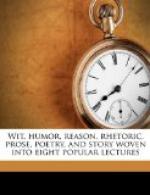There are more bright days than cloudy ones, a thousand song birds for every rain-crow, a whole acre of green grass for every grave, more persons outside the penitentiary than inside, more good men than bad, more good women than good men; slavery, dueling, lottery and polygamy are outlawed, the saloon is on the run, the wide world will soon be so sick of war that universal peace, with “good will among men,” will prevail, labor and capital will be peaceful partners and human brotherhood will rule in righteousness throughout the world.
“O, this is not so bad a world,
As some would like to make
it,
And whether it is good or bad,
Depends on how we take it.”
Fanny Crosby, whose gospel hymns are continually singing souls into the kingdom, when but six weeks old lost her sight and for ninety-two years made her way in literal darkness, without seeing the beauties of nature about her, the blue sky with its sun, moon and stars above her, the faces of her loved ones, and yet at ninety-two she said: “I never worry, never think disagreeable things, never find fault with anything or anybody. If in all the world there is a happier being than myself, I would like to shake that one’s hand.” No wonder out of such contentment came such songs as, “Jesus is calling,” “I am Thine, O Lord,” “Safe in the arms of Jesus.”
How different the cultured young woman, with all her senses preserved, who after passing through a flower garden where perfect sight had feasted on the beauty of the scene said:
“To think of summers yet to come,
That I am not to see;
To think a weed is yet to bloom,
From dust that I shall be.”
Poor soul! Instead of enjoying the summer she had, she was coveting all the summers between her and eternity. Instead of thanking God for the immortality of the soul when done with the body, she was disappointed because she couldn’t carry the old body along with her. Don’t let these things trouble you. Live one summer so you will be worthy to breathe the air of the next if you live to see it; take care of your body so it will make a decent weed if God chooses to make one out of your remains.
Enjoy what you have, don’t covet what you have not, thank God for your home on earth, follow Fanny Crosby’s receipt for contentment and you will be happy enough to shake hands with her in the “Land of the Leal.”
Before I close would you like to have me point you to greatness? In attempting to do so, I would not point you to Congress hall or Senate chamber. You can find greatness anywhere.
That was greatness when John Bartholamew held the throttle of an engine going over the Sierra mountains, with a train load of passengers depending upon his skill and caution, and swinging round a curve he saw the wood-work of a tunnel before him on fire. To attempt to stop the train then, would be to halt in the flames. He threw on more steam and sent the train whizzing through the furnace of fire. Passing out on the other end he was badly burned, but still held the rein of his iron horse. A poem dedicated to this brave engineer closes with the verse:




